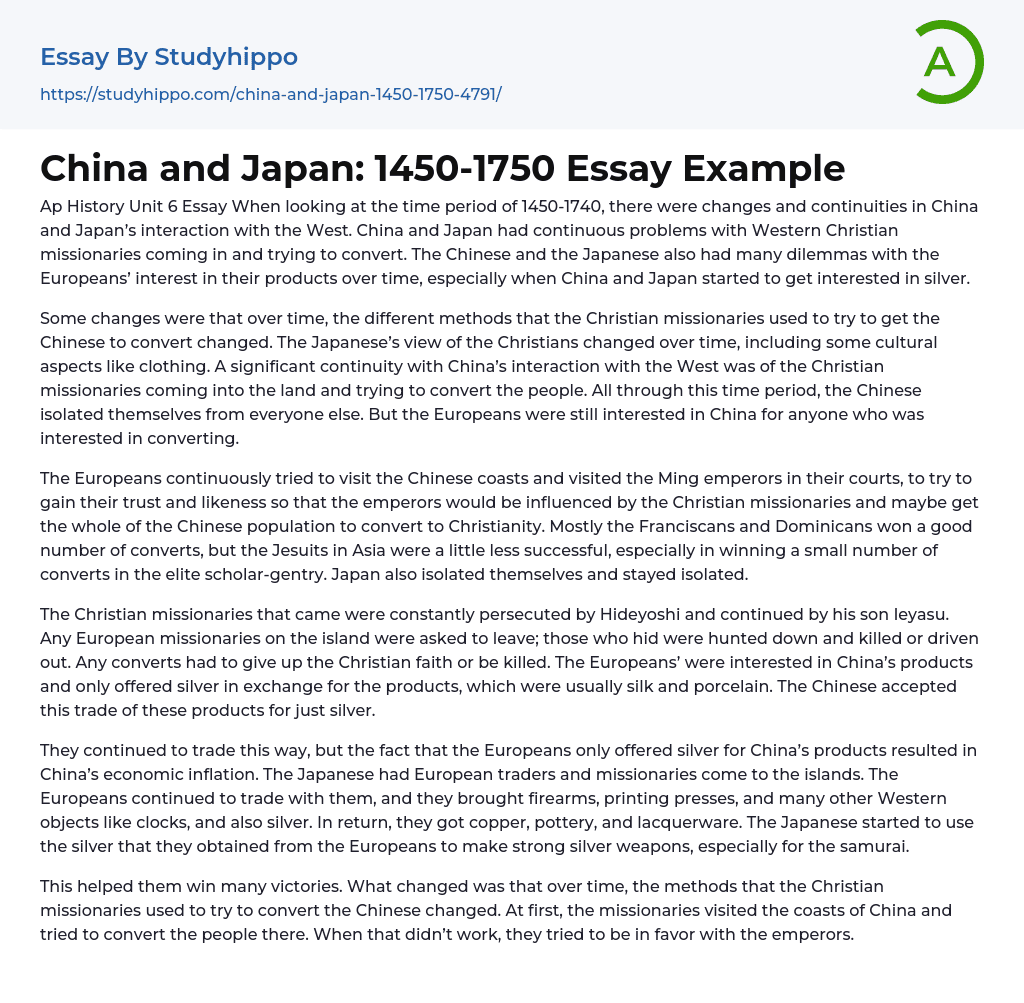When looking at the time period of 1450-1740, there were changes and continuities in China and Japan’s interaction with the West. China and Japan had continuous problems with Western Christian missionaries coming in and trying to convert. The Chinese and the Japanese also had many dilemmas with the Europeans’ interest in their products over time, especially when China and Japan started to get interested in silver.
Some changes were that over time, the different methods that the Christian missionaries used to try to get the Chinese to convert changed. The Japanese’s view of the Christians changed over time, including some cultural aspects like clothing. A significant continuity with China’s interaction with the West was of the Christian missionaries coming into the land and trying to convert the people. All through this time period, the Chinese isolated themselve
...s from everyone else. But the Europeans were still interested in China for anyone who was interested in converting.
The Europeans continuously tried to visit the Chinese coasts and visited the Ming emperors in their courts, to try to gain their trust and likeness so that the emperors would be influenced by the Christian missionaries and maybe get the whole of the Chinese population to convert to Christianity. Mostly the Franciscans and Dominicans won a good number of converts, but the Jesuits in Asia were a little less successful, especially in winning a small number of converts in the elite scholar-gentry. Japan also isolated themselves and stayed isolated.
The Christian missionaries that came were constantly persecuted by Hideyoshi and continued by his son Ieyasu. Any European missionaries on the island were asked to leave; those who hid were hunted down and killed
or driven out. Any converts had to give up the Christian faith or be killed. The Europeans’ were interested in China’s products and only offered silver in exchange for the products, which were usually silk and porcelain. The Chinese accepted this trade of these products for just silver.
They continued to trade this way, but the fact that the Europeans only offered silver for China’s products resulted in China’s economic inflation. The Japanese had European traders and missionaries come to the islands. The Europeans continued to trade with them, and they brought firearms, printing presses, and many other Western objects like clocks, and also silver. In return, they got copper, pottery, and lacquerware. The Japanese started to use the silver that they obtained from the Europeans to make strong silver weapons, especially for the samurai.
This helped them win many victories. What changed was that over time, the methods that the Christian missionaries used to try to convert the Chinese changed. At first, the missionaries visited the coasts of China and tried to convert the people there. When that didn’t work, they tried to be in favor with the emperors. After attempting that, the Franciscans and Dominicans tried to get converts among the common people, which gained some thousands. Then the Jesuits developed a different method.
They tried to impress them with scientific and technological skills to attract the Chinese elite to convert. They eventually won some converts but also got strange looks from the court officials because they though the “barbarians” were strange. In Japan, the treatment of the missionaries just got more and more negative. Nobunga saw Christianity as sort of an enemy to the Buddhist
religion. Some of the daimyos were converted. Nobunga started to wear Western clothes, and wanted artists to paint like the Westerners, especially scenes of Mary and Jesus.
But when Nobunga was murdered, the conversion program started to fail. Hideyoshi, his successor, seemed to hate Christianity and did everything from expelling the missionaries to killing the Japanese who managed to convert. After that, many more actions were carried out to prevent any existence of Christianity, including the import of Christian books, and permitting ships only to a certain group of cities. China and Japan’s interaction with the West was a fluctuating one.
China, Japan, and the West benefited from the trading, but had many conflicts with the Christian missionaries coming in and trying so hard to convert the Chinese and Japanese. China and Japan’s isolating played a big part in their communication with the West, which gave the West a negative attitude towards the converting incidents, but both were still influenced by a few cultural aspects like clothing and art. China, Japan, and the West had a twisted and changing relationship with each other.
- Baptism essays
- Holy Spirit essays
- Jesus Christ essays
- Adam And Eve essays
- Crucifixion Of Jesus essays
- Crusades essays
- Eucharist essays
- God The Father essays
- Pope essays
- Protestantism essays
- Christian essays
- Church essays
- Elizabeth essays
- Sacrament essays
- Catholic Church essays
- Lord essays
- Priest essays
- Protestant Reformation essays
- Bangladesh essays
- China essays
- Hong Kong essays
- India essays
- Japan essays
- Kuala Lumpur essays
- Malaysia essays
- Manila essays
- Pakistan essays
- Philippines essays
- Singapore essays
- Vietnam essays
- Vietnamese essays
- Afterlife essays
- Atheism essays
- Bible essays
- Buddhism essays
- Christian Worldview essays
- Christianity essays
- Confession essays
- Cosmological Argument essays
- Deism essays
- Devil essays
- Existence of God essays
- Faith essays
- Freedom Of Religion essays
- God essays
- Hinduism essays
- Immortality essays
- Islam essays
- Jainism essays
- Jews essays




